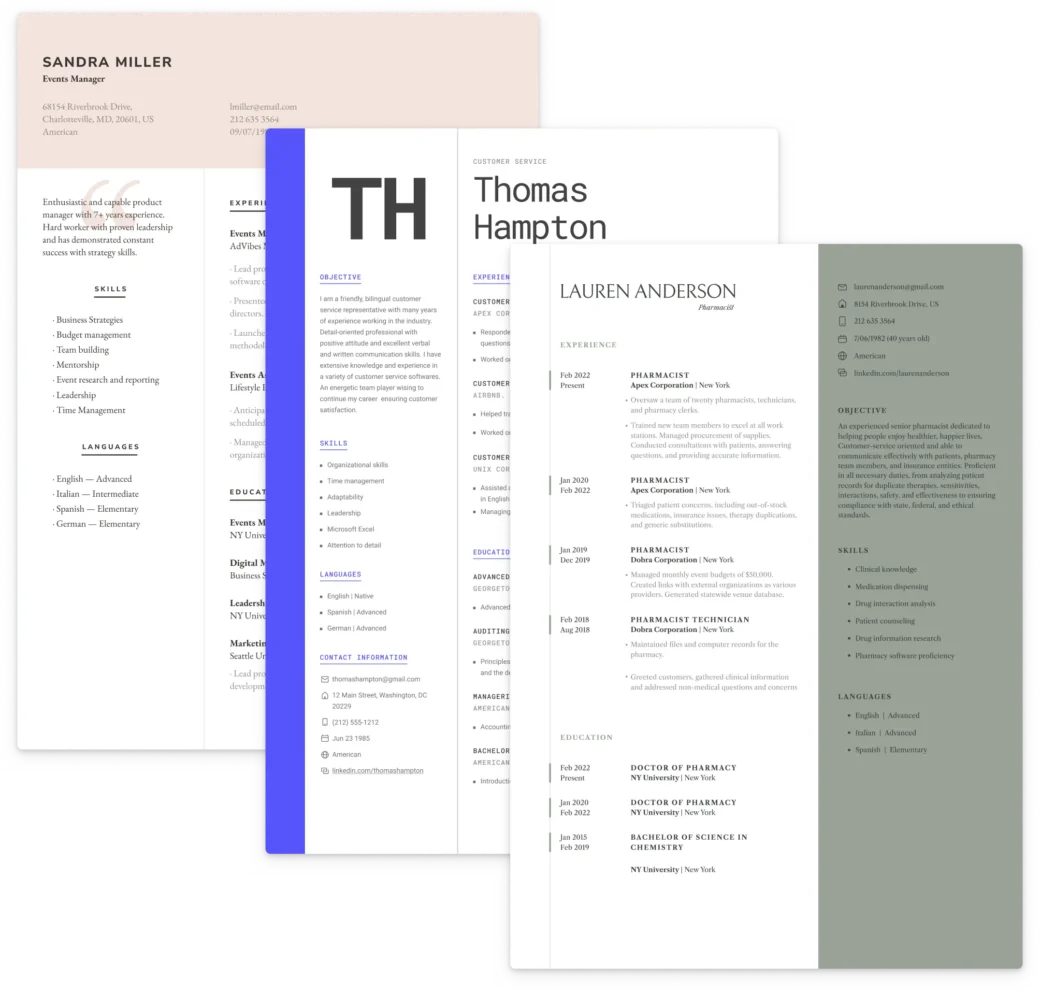Career growth is an important part of everyone’s professional life.
Whether you are a manager or a lower-tier employee, it’s important to grow as a professional so that you can progress in your career and gain new skills.
If you’re looking to make your professional life more fulfilling, the best thing to do is start by writing a career growth plan. This document will help you prioritize what’s important so that when opportunities arise, you know how to take advantage of them.
If you’re not sure where to start, our team at ResumeGiants is here to help! In this post, we’ll cover the meaning of professional growth, strategies on how to grow in your career, and an example of a career progression plan.
What Do We Mean By Career Growth?
Your career is a big part of who you are. It brings meaning to your life, as well as personal development and fulfillment. But if you want to keep growing in your career, it’s important to know what that means.
To grow in your career is not just a matter of advancing within the company where you work—although that can be part of it.
Professional growth is the process of improving your skills, knowledge and experience that bring out the best in you at work.
It allows you more autonomy over how much time or energy you put into certain projects or tasks.
It can also mean finding career learning opportunities, changing jobs, or even trying out a completely new career plan entirely. Growth is about becoming better than who you were yesterday—and this extends to career growth too!
Benefits of Professional Growth
There are many benefits to growing professionally. It…
- Provides opportunities for advancement within your organization and allows you to gradually move towards leadership roles (e.g as a manager).
- Allows you to become more marketable. As you learn new things about your industry or job field, you also become more valuable to an employer.
- Can help you get a higher-paying job
- Makes us happier employees overall and helps with work-life balance.
It also allows people to take on new challenges instead of growing stagnant in their current role’s tasks indefinitely (which happens way too often).
Strategies to Grow in your Career
Career learning opportunities can help both you and your employer. Creating a career growth plan will help you accomplish things like getting promoted or finding a new job.
Allowing employees to work on career planning and development can also help employers. When companies provide opportunities for professional development, they’re better able to attract and retain talent.
The following strategies can help you get started:
1. Get to know your peers
It’s important to build good relationships with your immediate peers in your company.
You don’t have to be best buddies with everyone in order to get ahead. Sometimes just having lunch with a coworker once every couple weeks is enough!
Talking face-to-face helps foster better relationships between coworkers. You’ll feel more comfortable helping each other out later down the road if the need arises.
2. Develop your skills
You may not be comfortable with certain aspects of your job or the way things are done. But if you’re just going to sit back and complain about it, nothing will change.
Instead, try learning more about what you could do to improve these processes yourself. Use outside resources such as books and websites on the subject matter. If possible, take courses in-house with other employees who have more knowledge than you do.
What if there aren’t any in-house courses available? Consider taking an online certification course or even teaching yourself through online tutorials.
3. Volunteer for new projects
Volunteering for new projects is a great way to grow in your career. It allows you to learn new skills and develop your professional network.
If you are not sure what project to volunteer for, ask your manager or team members for advice. They have probably been through the same process themselves and can give valuable tips on how they chose their next assignment.
4. Get feedback
As a professional, you probably understand the importance of feedback. It can help you improve your skills in an area where you may need some work. It can also give you a chance to see how others perceive your performance at work.
Focus on asking questions that show genuine interest in learning more about yourself, rather than seeking validation for something you already think you know.
For example: “I noticed that I tend to take longer than other people when completing my assignments. What do you think causes this?” Or “Can I ask how my presentation went last week? Does anyone have any constructive criticism?”
Have a one-on-one meeting with your boss at least once a year. Talk about things you’re good at and things that could use improvement. Ask about upcoming projects, and how you could take on new responsibilities.
5. Attend conferences and classes
Attending conferences and classes is a great way to learn new skills, meet new people, and gain valuable knowledge. You can learn how other companies tackle problems similar to what you are currently facing at work.
You may also find that attending conferences can help you network and develop new contacts within the industry.
6. Build relationships with other departments
One of the best ways to achieve career growth is by building relationships with people in other departments in your company. The more people you know, the more opportunities will open up.
Of course, building relationships can be a bit challenging when you’re just starting out at your company. However, it’s an important skill that can pay dividends down the road.
Make an effort to get to know people from other departments and their work areas as soon as possible after joining the company.
This is also a great opportunity for networking. If someone recognizes that you’re interested in what they do, they might recommend opportunities, give job advice, or give good references later on.
If nothing else, it will help make everyone feel like part of one big team instead of separate entities working independently toward different goals.
7. Take the initiative to solve problems
A large step in your professional growth is acquiring the ability to take the initiative and solve problems.
If there’s something that needs doing, don’t wait for someone else to do it. Get it done yourself! Don’t be afraid of taking ownership for issues that arise in your workplace or in your team.
However, you should also make sure you don’t overextend yourself or get overwhelmed by everything that needs fixing in your company.
How to Create a Career Growth Plan
Many people make the mistake of putting off writing their career plans because they think it’s too much work or too difficult. But taking the time to create one will definitely help more than hinder!
In a nutshell, a career progression plan is an outline of what you need to do in order to reach your goals. It’s an actionable step-by-step approach that shows how you can achieve those goals.
It should include:
- Goals and objectives
- Resources needed to achieve those goals
- Timeline for achieving the goals
- A list of skills and knowledge you need to acquire
- What type of experience will help you advance in your field (often called “adjacent skills”)
- Specific job titles or roles that are appropriate for your level of experience (typically referred to as “next career steps”)
Once completed, try sharing your career plan with someone who has been successful at achieving similar goals in their field. This step could help give some clarity around whether or not your career plans are realistic. If they are not, then tweak them accordingly until they are!
Examples of Career Progression
To sum up, some of the measurable examples of career growth include:
- Keeping your skills up to date by taking classes and certifications
- Taking on more responsibility at work
- Learning about other departments within your company
- Moving up in the company and earning more money
- Learning about other industries outside of your current one so that you can gain a better understanding of how they operate and connect with yours. This helps you see new opportunities that might have been invisible before.
However, it’s important to remember that learning opportunities in your career don’t always mean staying within the same company. It may be time to prepare your letter of resignation and explore opportunities elsewhere.
You may feel that there aren’t any opportunities left to advance where you’re currently employed. In this case, leaving may lead you somewhere better suited towards your goals.
If you’re thinking of changing jobs to continue your career growth, use our free online resume builder to make the application process smoother and hassle-free!

Build your perfect resume with ease
Craft the perfect resume effortlessly with our builder. Get started today!
Related Posts

